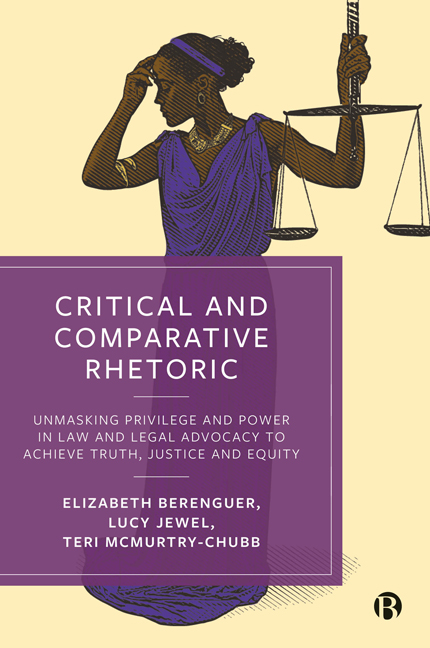 Critical and Comparative Rhetoric
Critical and Comparative Rhetoric Book contents
- Frontmatter
- Contents
- Detailed Contents
- List of Figures and Tables
- About the Authors
- Introduction
- 1 What’s Wrong with Aristotle?
- 2 Problematizing Aristotle: Renovating and Remodeling Traditional Legal Rhetoric
- 3 Shifting the Focus from the West
- 4 Multicultural Rhetorics
- 5 Reproducing the Canon, Reproducing Inequity (Traditional Rhetoric)
- 6 Interrupting the Canon
- 7 Disrupting the Canon: Multicultural Rhetorical Strategies in Action
- References
- Index
6 - Interrupting the Canon
Published online by Cambridge University Press: 18 January 2024
- Frontmatter
- Contents
- Detailed Contents
- List of Figures and Tables
- About the Authors
- Introduction
- 1 What’s Wrong with Aristotle?
- 2 Problematizing Aristotle: Renovating and Remodeling Traditional Legal Rhetoric
- 3 Shifting the Focus from the West
- 4 Multicultural Rhetorics
- 5 Reproducing the Canon, Reproducing Inequity (Traditional Rhetoric)
- 6 Interrupting the Canon
- 7 Disrupting the Canon: Multicultural Rhetorical Strategies in Action
- References
- Index
Summary
Gideon v. Wainwright, 373 U.S. 335 (1963)
Summary of Gideon v. Wainwright
In Gideon, the Supreme Court acknowledged that the Fourteenth Amendment requires states to ensure due process by appointing an attorney to represent criminal defendants accused of a serious crime. Prior to Gideon, states were not required to appoint counsel for criminal defendants unless the defendant was charged with a capital offense or there was some other special circumstance warranting appointment of counsel. This rule was established in Betts v. Brady, and it led to great inconsistencies across jurisdictions, even though by the time of Gideon, most states had adopted some sort of system for ensuring the representation of criminal defendants, at least in felony cases. Florida, however, was one of the hold-out states that did not permit appointment of counsel absent evidence of some special circumstance.
Clarence Earl Gideon was charged with burglary of a billiard hall, and before he was tried, he asked the court to appoint an attorney to represent him. The trial court denied his request, and Gideon was ultimately convicted and sentenced to prison. From there, he sent a hand-written petition to the United States Supreme Court begging for relief. The Supreme Court granted review and posed the question, “Should this Court's holding in Betts v. Brady be overruled?” It then appointed attorney Abe Fortas to represent the indigent Clarence Earl Gideon and answer this question.
In his initial brief, Abe Fortas employed a variety of interrupters that ultimately convinced the United States Supreme Court to overrule its decision in Betts v. Brady. These interrupters disrupted the canon by retreating from blind adherence to stare decisis through demonstrating the flaws inherent in the special circumstances test. They also obscured the syllogism by relying on studies and policy arguments as a prominent source of support rather than pure legal doctrine, and then using persuasive legal authority from other jurisdictions to argue for a change in the law. In the Petitioner Brief, the legal syllogism is challenging for the reader to identify, yet the Brief is ultimately persuasive and effective.
- Type
- Chapter
- Information
- Critical and Comparative RhetoricUnmasking Privilege and Power in Law and Legal Advocacy to Achieve Truth, Justice, and Equity, pp. 163 - 204Publisher: Bristol University PressPrint publication year: 2023


